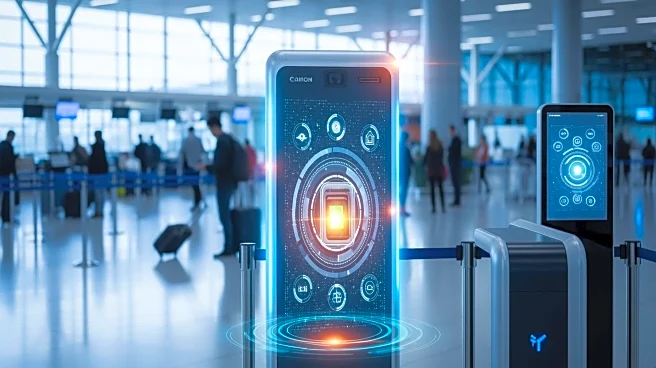What's Happening?
Biometric technology at airports, once met with skepticism, is now preferred by travelers globally. According to a report by Sita, a significant decrease in the number of passengers who have not used biometric technology at airports was observed, dropping
from 41% in 2024 to 31% in 2025. This shift is attributed to the growing comfort with biometric identification, which is increasingly used for accessing mobile phones and workplaces. Sarah Samuel, senior vice president of airport and airline operations in Asia-Pacific at Amadeus, noted that the expectation for on-demand services, influenced by companies like Uber and Netflix, extends to travel. The technology is particularly popular among younger travelers, men, and frequent flyers, as highlighted in Sita's 2025 Passenger IT Insights report, which surveyed 7,500 passengers across 25 countries.
Why It's Important?
The growing acceptance of biometric technology in airports signifies a major shift in travel security and convenience. This trend could lead to faster and more efficient airport processes, reducing wait times and enhancing passenger experience. For the travel industry, this could mean increased customer satisfaction and potentially higher revenues as travelers opt for airports offering advanced biometric systems. However, it also raises concerns about privacy and data security, as biometric data becomes more widely used and stored. Stakeholders in the travel and technology sectors must address these concerns to maintain trust and ensure compliance with data protection regulations.
What's Next?
As biometric technology becomes more integrated into airport operations, further advancements and expansions are expected. Airports may continue to invest in and refine these systems to enhance security and efficiency. Additionally, discussions around privacy and data protection are likely to intensify, prompting regulatory bodies to establish clearer guidelines and standards. Travelers can anticipate more seamless experiences, but they may also need to stay informed about how their biometric data is used and protected.
Beyond the Headlines
The adoption of biometric technology in airports could have broader implications for other sectors, such as retail and healthcare, where similar technologies might be employed to streamline operations and improve customer experiences. Ethical considerations regarding the use of biometric data, including potential biases and the need for transparency, will become increasingly important as these technologies proliferate.














